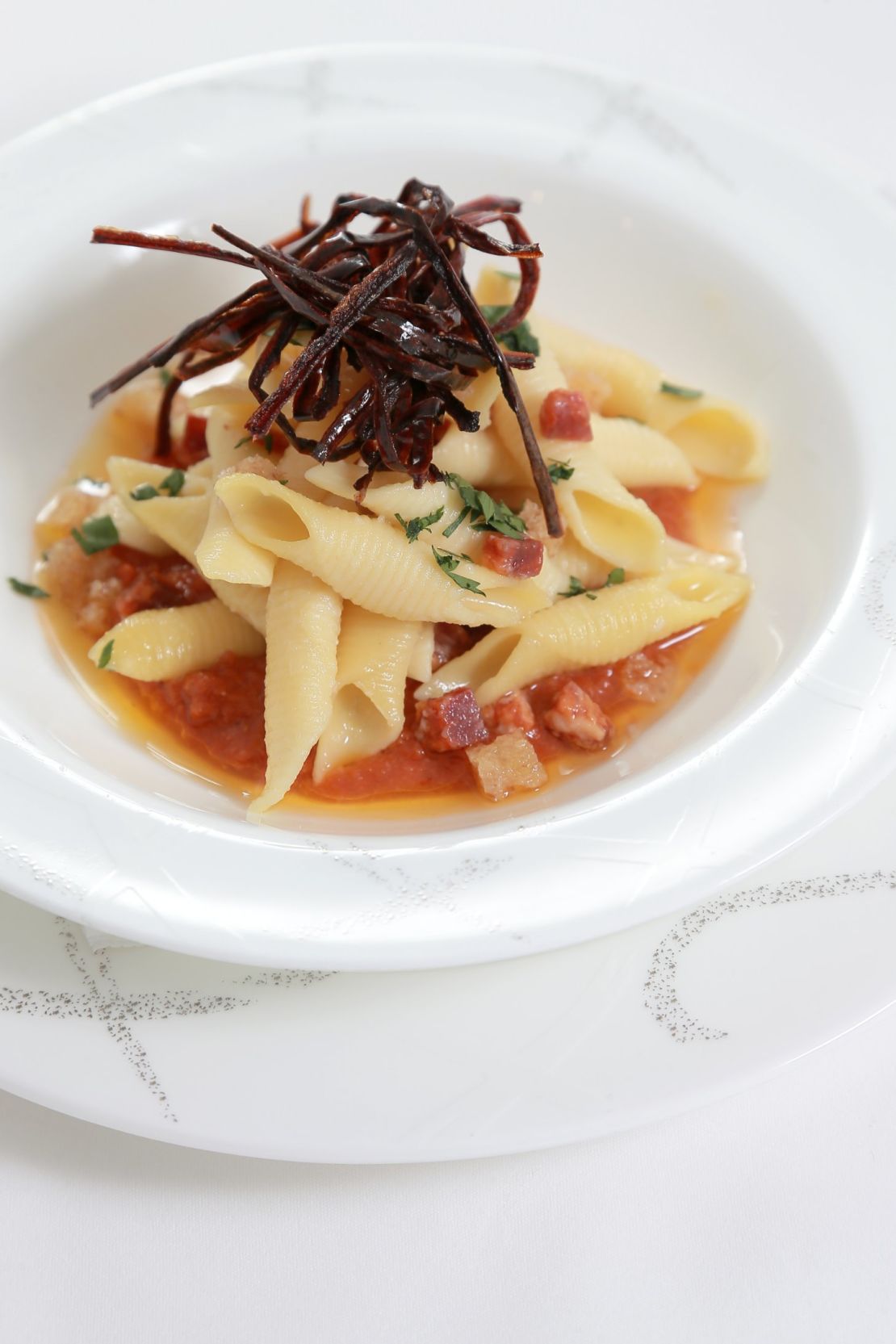Story highlights
Can fine-dining experiences really be pulled off at 30,000 feet? Some airlines think so.
Cathay Pacific partners with Pino Lavarra from Michelin-starred Hong Kong restaurant Tosca
Some recipes have to be tweaked to meet food safety regulations
More and more airlines are teaming up with world-class chefs, hoping to solve that ultimate #firstworldproblem: how to serve a top-rate meal in the air.
The strategy seems to be to throw glamorous, big-name chefs at the problem and hope that they can recreate on planes that same gastronomic magic they do at their restaurants.
Celebrity chef Heston Blumenthal helped British Airways with a special Olympic in-flight menu in 2012; Joel Robuchon and Air France have made headlines with their collaboration, which began in 2011.
The Ritz-Carlton Hong Kong has also been tasked with creating a first-class menu for Cathay Pacific.
Their Italian restaurant, Tosca, is famous for creative Italian cooking and recently received one Michelin star after Pino Lavarra took over as executive chef.
Lavarra was asked to whip up a gourmet menu that will work at 30,000 feet above sea level.
He went one step further: Lavarra is serving the same in-flight meal at Tosca as a special four-course “first class menu” costing HK$1,400 ($180) per head.
Airplane food served at an expensive restaurant?
Lavarra admits it’s not the easiest sell.
“I agree that in-flight food has a bad reputation. I also find most of it terrible,” says the chef.
MORE: Would you choose an airline based on its menu?
Lofty ambitions
He says The Ritz-Carlton’s height inspired the menu.
The hotel is nearly 500 meters (1,640 feet) above ground, earning it the superlative of “world’s highest hotel,” and bringing its guests close to a mid-air experience, without them getting on a plane.
The two menus – in-flight and on the ground – can’t be exactly the same however.
Lavarra says the idea of recreating gourmet restaurant experiences in the air will only ever be a concept.
In reality, it will never be replicated.

“The meal served on the plane, it’s cooked by somebody else, it’s prepared eight to 12 hours ahead of time, it’s mass production,” says Lavarra.
In other words, it isn’t the personalized, fussy cooking of a top-notch restaurant.
But the biggest problem is an airline’s concern for food safety, which trumps the customer’s desire for deliciousness.
“Everything has to be pasteurized, and you can’t use raw tuna or raw beef,” says Lavarra.
The chef serves high-quality beef carpaccio on both his in flight and restaurant menus.
The one at the restaurant is a traditional Italian appetizer of thick slices of tender raw beef paired with ricotta and a perky tomato jam.
The same dish on the plane has to be tweaked to get around food safety regulations: the beef is seared first, so it isn’t really a carpaccio anymore.
For connoisseurs, it would be the equivalent of adding water to aged whiskey.
MORE: Skip the pasta! And other unsavory truths about airplane food
Don’t count on the bread
“My food costs are 45%. I have given my food supplier list to Cathay and I believe they use the exact same ingredients as I do at Tosca,” says Lavarra, who has had to adjust many of the other ingredients so the dishes can withstand storage and re-heating.
One item that made the chef throw in the towel was the bread.
“It is quite tricky to make it crunchy and nice, you have to reheat it, on a flight that is basically impossible to do. The airline caterers have done a decent job considering it is baked 15 hours in advance, but it’s not ‘wow,’” he says.
The chef is also taking a deeper look at the overall experience for gourmets.
At the restaurant, the experience is a gradual build-up to a crescendo of a main dish. The chef would temper the first few courses so the diner is not overwhelmed.
“From start to end, you have to keep the interest of the customer,” says Lavarra.
On a flight, it’s a shorter meal, with Lavarra’s special main course competing with other regular offerings.
The chef makes sure to dial up the flavors of his main dish, including the tastiest, most intense ingredients.
“I only have one chance to impress the customer. I have to be spot on,” he says.
Cathay Pacific’s partnership with Pino Lavarra and Tosca runs until July 31, 2014, on various long-haul and regional flights departing Hong Kong.




